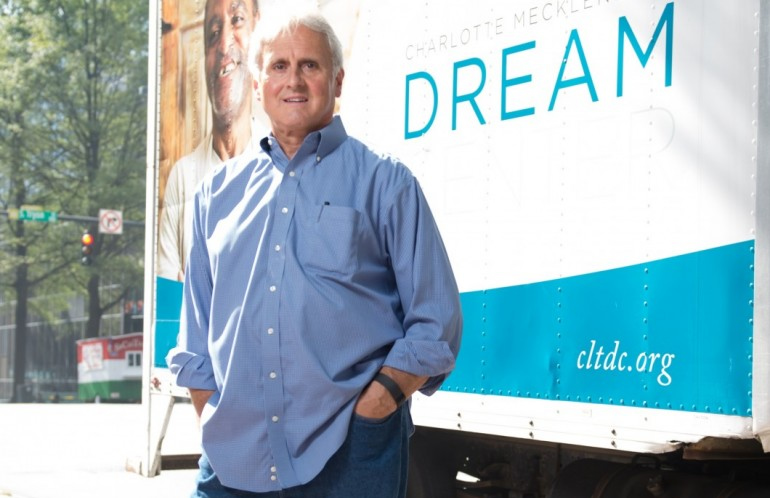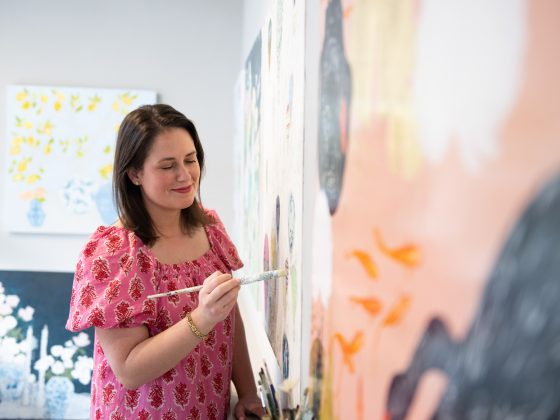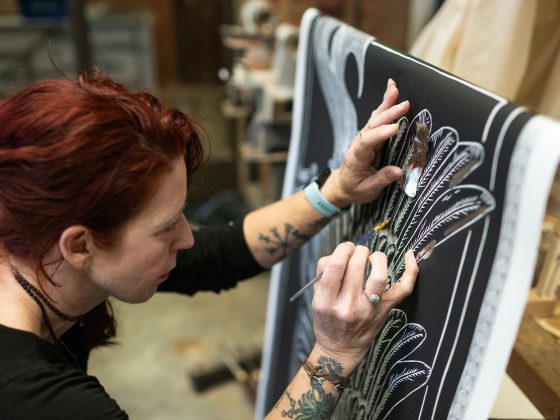Have you heard of the Dream Center? The story starts with Charlotte’s own history and the tale of one very dedicated member of the city’s fabric.
Outside of Charlotte’s gleaming skyscrapers, beyond Bank of America Stadium, and past the white affluence of Plaza Midwood, there is a neighborhood, J.T. Williams, that sits within city limits, though not often within view of city residents. The median income in J.T. Williams, which is 90% black, hovers around $20,000, and, until recently, crimes per week clocked in at an average of 5.6. Lemon cars, lacking hubcaps and fenders, trundle down pothole-pocked roads, faces peer from locked windows, and young boys toss around footballs in the unlined fields in front of Turning Point Academy, a K-12 learning institution for students with behavioral problems.
The Equality of Opportunity Project, a research venture led by Stanford professor Raj Chetty and Harvard professor Nathaniel Hendren, published a study in January of 2014 that ranked the Queen City dead last among the 50 largest cities in the U.S. to according to its rate of upward mobility. It’s all too easy for Charlotteans to slip through the economic cracks and, once they do, it’s all too hard for them to hoist themselves back up.
It’s a broken system that’s not easily fixed. Organizations like the Charlotte Mecklenburg Dream Center are acutely aware of this fact, but that doesn’t stop the determined folk behind the CMDC from trying. The Dream Center can’t change the system, but it can and does change lives.
Each Saturday, Dream Center volunteers materialize in J.T. Williams and Reed Park, a demographically similar Charlotte neighborhood, where they distribute boxes of chocolate chip cookies, landscape, or grill out. These days, its volunteers are welcomed like longtime friends in J.T. Williams and Reed Park, but when they first arrived, most residents refused to emerge from their houses or even open their doors, and the few who did demanded to know what the volunteers were doing in their neighborhood. Older residents rarely left their dwellings, and most residents had never spoken to their neighbors. Within months of the Dream Center’s efforts, crime rates had dropped by about 80% in Reed Park, and, in both neighborhoods, a sense of community developed, linking neighbors to each other and to the volunteers. “People are communicating, building relationships with us and with each other,” says Jim Noble, pastor, chef, restaurateur, and founder of the Charlotte Mecklenburg Dream Center.
Born and raised in High Point, North Carolina, Noble came to cooking before he came to God, opening his first restaurant in 1983 and his first ministry in 1998. He now owns and operates five restaurants, including The King’s Kitchen, a not-for-profit restaurant and headquarters for Noble’s latest missionary efforts. In 2013, Noble founded Restoration House of Charlotte, which would later become an affiliate of the Dream Center Network, an international faith-based organization that administers to the needs of the physically, emotionally, or spiritually starved. Noble’s Dream Center implements programs intended to reach and support the homeless, hopeless, and disadvantaged—a wide demographic by any standards.
Its success boils down to a universal ingredient: the construction and maintenance of relationships. “We have to be intentional about building trust with the individuals we serve in order to earn the right to minister to them,” Dream Center Executive Director Bo Frowine explains.
“The most important thing we can offer someone is our time. By listening to what they have going on in their life, we can figure out the best way to really help that person.”
Frowine speaks from personal experience. In his twenties, he struggled heavily with substance abuse, and found himself existing on his mother’s couch in a perpetual drunken stupor. His family eventually located a recovery center that would accept him without insurance, and Frowine was able to get sober, but that was only half the battle; Frowine remained deeply depressed and tried to end his life shortly after leaving the recovery center. After a prolonged stint in the hospital, during which it was unclear whether he would live or die, Frowine was released. “I read the Bible for the first time in my life and things started to change,” says Frowine. “I thought God must have kept me alive for a purpose.”
Through the Dream Center, Frowine is indeed living his life with purpose. In addition to performing weekly street ministry to the homeless in uptown and the economically troubled in Charlotte’s oft-ignored neighborhoods, the Dream Center also maintains a discipleship program. The program supports those who have been without work for extended periods of time, are recovering from substance abuse, or are plagued by personal demons, as they complete an intensive course in which they are exposed to accountability, structure, and Bible study, as well as job and financial training. At the end of the program, most graduates emerge with a steady income and a tenacious faith.
Alan Schram is one such graduate. Blurry, blue tattoos mottle the majority of Schram’s skin, permanent, inky reminders of his various prison sentences. He walks with a limp, the lingering result of a knife wound he suffered at the hand of a former cellmate, and speaks with a thick Southern accent, despite his nomadic, military upbringing. In 1974, he started drinking and doing drugs. He was nine years old. Within five years, he was addicted.
For a decade, the benches near the corner of Trade and Tryon were Schram’s bedroom and living room. His neighbors knew him as “Turtle.” Banking professionals who work on those streets knew him as “that mean homeless guy who’ll jump in the fountain for a dollar.” One Friday evening, someone brought him a chili cheese dog. That someone was a Dream Center volunteer participating in weekly street ministry. She came back every day until Schram agreed to go into the King’s Kitchen and, from there, into a recovery program. “She didn’t give up on me,” Schram remembers.
After that, his road to recovery was anything but smooth. He dropped in and out of rehab, flitted among states and street benches, but he always found his way back to King’s Kitchen and the Dream Center. Schram had, at long last, found a spiritual home. A physical home followed shortly thereafter. He is cognizant of the fact that a change in attitude was a prerequisite for his rehabilitation. He had to believe that life could be better. In other words, he had to hope.
“When my wife and I were faced with a great challenge that seemed impossible and somebody brought hope to me, it so changed my life that I want to tell other people,” explains Noble. “There is always hope.”
Hope is critical, because “homelessness and substance abuse are the symptoms, not the issue,” reminds Frowine. According to Noble, underlying issues can’t be fixed with brick and mortar, government assistance, or restricted access to a bottle. The issue requires a healing process that won’t succeed without hope.
At a time when the seams of Charlotte’s social fabric appear to have been torn asunder by violence, racism, riots, and ever-widening economic stratification, the Dream Center affiliates summon the bravery necessary to go, not just into Charlotte’s most dangerous neighborhoods, but, more importantly, into Charlotte’s bleakest psyches.
“It’s easy for us to walk past the homeless and think, ‘they made bad choices,’ especially to make us feel better about walking past them,” explains Frowine. “But when I listen to their stories…I realize they’re doing pretty well, because if I had lived their life, I’d be in much worse shape.” Noble, Frowine and the rest of the Dream Center team hope that others will be inspired to listen with an open heart, to see with the grace of God, and to care with the full force of humanity, as they walk among their fellow Charlotte residents—their fellow humankind.












